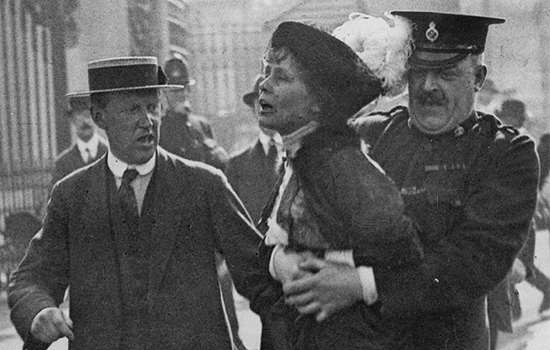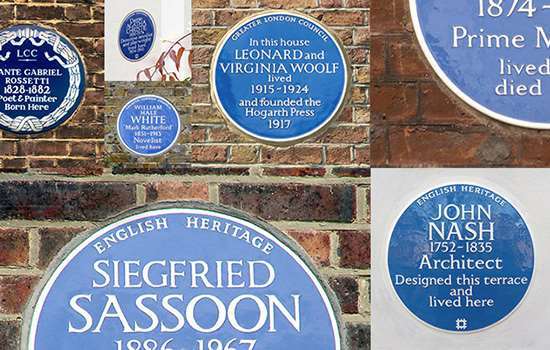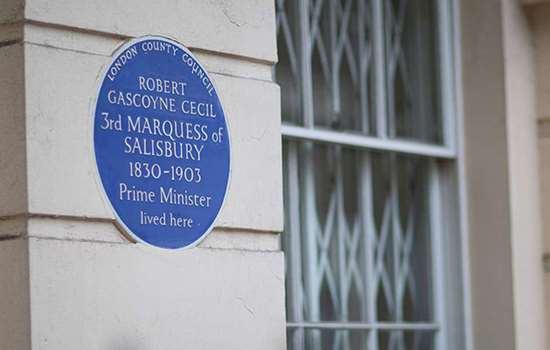FENWICK, Ethel Gordon (1857-1947)
Plaque erected in 1999 by English Heritage at 20 Upper Wimpole Street, Marylebone, London, W1G 6LZ, City of Westminster
All images © English Heritage
Profession
Nursing Reformer
Category
Medicine, Philanthropy and Reform
Inscription
ETHEL GORDON FENWICK 1857-1947 Nursing Reformer lived here 1887-1924
Material
Ceramic
Ethel Gordon Fenwick, who campaigned successfully to raise the status and standards of nursing, is commemorated with an English Heritage plaque at 20 Upper Wimpole Street in Marylebone.
Early life
Born in Elgin, Scotland, and raised in Nottinghamshire, Ethel Gordon Manson was determined to become a nurse from an early age. She trained in Nottingham and Manchester and worked as a sister in the London Hospital before becoming – at the age of just 24 – Matron and Superintendent of Nursing at St Bartholomew’s Hospital.
At St Barts she set high standards for her staff, and improved their working conditions. It was there too that she met Dr Bedford Fenwick (1855–1939), who she married in July 1887. Ethel resigned her post, as was then expected of a married woman, and the couple set up home at 20 Upper Wimpole Street. Their son, Christian, was born in 1888.
Nursing reformer
In married life Fenwick continued to pursue her passion for nursing by promoting the professional development of nurses. A standard caricature of the nurse in the late 19th century was the drunken and incompetent Mrs Gamp in Charles Dickens’s Martin Chuzzlewit. Fenwick did as much as any individual to change this.
In November 1887 Fenwick held a meeting of matrons and doctors in her drawing room at number 20, and it was there that the British Nurses’ Association was founded. In 1893 this became the first women’s professional body to receive a royal charter. Fenwick was also the founding spirit behind the (still thriving) International Council of Nurses in 1899. She chaired its first congress in 1901, and attended her last, at the age of 80, in 1937.
In 1892 Fenwick took over a journal, the Nursing Record, which she later renamed the British Journal of Nursing. She edited it for 53 years from 1902.
State registration for nurses
Fenwick’s greatest achievement was her successful campaign for the state registration of nurses, which distinguished trained nurses from the untrained. This was, she informed the readers of the British Medical Journal in 1909, ‘a question affecting the safety and well-being of the community in general’, since women calling themselves nurses ‘have been convicted and hanged for murder [and] proved guilty of … extensive frauds and of numerous thefts’.
A supporter of women’s suffrage, Fenwick also believed that ‘the nurse question is the woman question’. She encountered strong opposition to state registration from many doctors and hospital managers. Florence Nightingale thought it wrong to judge nursing ability by theoretical exams.
Fenwick founded the Society for the State Registration of Nurses in 1902, and – at the third attempt – saw registration become law in December 1919 (she watched from the House of Commons gallery). By this time the deficiencies in training and standards demonstrated during the First World War had convinced many more nurses of the benefits of registration.
Ethel Gordon Fenwick became, appropriately, ‘State Registered Nurse No. 1’ and she was appointed to the new statutory body, the General Nursing Council.
Later life
Fenwick moved away from Upper Wimpole Street in late 1924 or early 1925 to 12 Barton Street, Westminster, where she lived until 1940.
Her later years were marked by a feud with the College of Nursing, which had been established 1916 (and is now the Royal College of Nursing). Fenwick objected strongly to its campaign to allow assistant nurses join the register, and was voted off the General Nursing Council as a result. ‘State Enrolled Nurses’ were duly sanctioned in the 1940s, though not before Fenwick had fired off a stiff letter to Winston Churchill.
In 1926 she set up a rival institution, the British College of Nurses, which folded in 1956. Ethel Gordon Fenwick died in March 1947 at a friend’s house in St Alban’s.
Read more about Ethel Gordon Fenwick in the Oxford Dictionary of National Biography.


